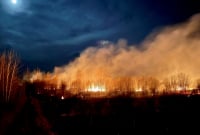Support strong Canadian climate journalism for 2025
Opposition leaders have yet to meet to discuss terms of reference for a possible public inquiry into foreign interference, NDP Leader Jagmeet Singh said Monday, with one national security expert saying their proposal will likely be a sticking point.
The Liberal government punted the decision-making around a potential inquiry to opposition parties on Saturday. It is asking them to do four things: find someone to lead the inquiry, set the terms of reference, come up with a timeline and determine how it will deal with sensitive information.
Intergovernmental Affairs Minister Dominic LeBlanc said getting their help is a way to avoid the partisan "buffoonery" that has taken over the topic following media reports about allegations that China meddled in the last two federal elections. He said he would like their response this month. The House of Commons is set to break for the summer in two weeks.
Singh said he has yet to hear from the government or Conservative Leader Pierre Poilievre on the matter, despite both saying on the weekend that they would be reaching out.
He said the government should call a public inquiry immediately, adding a House of Commons committee has already started the work around what it should look like.
"That work is something that New Democrats already anticipated needed to be done, and we called for it. So now with the signal that we're receiving from the government, if there's a genuine interest in moving forward, it's now on the government (to call a public inquiry)," Singh said Monday.
"The ball's in their court."
The New Democrats, Conservatives and Bloc Québécois have said they want to see a public inquiry called and concluded before the next federal election.
But it's a timeline that doesn't seem doable, said Wesley Wark, a senior fellow at the Centre for International Governance Innovation.
He said the fastest judicial inquiry Canada had in the last 20 years that took on this type of focused topic was the commission that looked into Canadian officials' actions in relation to Maher Arar. That process took two-and-a-half years.
The process is only complete when the government has responded to an inquiry's recommendations, said Wark, who also served two terms on former prime minister Stephen Harper's advisory council on national security from 2005 to 2009. That's "important for the public to understand," he said.
He also pointed to the Public Order Emergency Commission that wrapped up earlier this year. It completed a final report on the government's use of the Emergencies Act in response to last year's "Freedom Convoy" protests in less than a year. But the government has not yet had much time to respond to its recommendations.
Wark said if parliamentarians are serious about the process, it would likely take them past the next federal election, which could be scheduled as late as October 2025 but may be called or triggered sooner.
LeBlanc said on Saturday his party is hoping to govern until 2025 and that it's prepared to support a public process, whatever that may look like.
His comments came in response to former governor general David Johnston's decision Friday to resign as the government's special rapporteur on the issue by the end of this month.
His resignation on Friday seemingly blindsided Prime Minister Justin Trudeau, who was on a surprise trip to Ukraine. Earlier in the week, Trudeau had defended Johnston's work and integrity while stating publicly he would carry out the rest of his mandate.
Trudeau appointed Johnston in March to address gaps in the system, but opposition leaders demanded he resign amid accusations that he was biased because of a previous relationship with the Trudeau family.
Opposition leaders are not interested in appointing a new rapporteur — an option that remains on the table — and are instead demanding a public inquiry. Johnston's first report had concluded such an inquiry would not be feasible because most of the information about allegations of foreign meddling would have to remain secret.
Wark said it's a calculated move by the government to pass the onus onto opposition parties, who had been clamouring to be a part of the process.
"As a political gambit, this could work if the opposition parties either cannot agree among themselves, which is possible, or cannot come up with a justifiable framework for a public investigation, which is also a possible outcome," Wark said.
He said the government will be looking closely at their terms of reference: Do they focus on strengthening the government's capacity, or do they want a forensic examination that went on in the past?
"If the opposition parties stick to the examination of what went on in the past, the government thinks it has a winning hand there because they can just say, 'The opposition parties are not taking this seriously, and they're not interested in contributing to the strengthening of national security,'" Wark said.
"That's the real wedge issue here. It's not who would do an inquiry."
This report by The Canadian Press was first published June 12, 2023.




Comments